These smart insoles might be the missing link to running faster
Day 7: Nah, you can’t have too much tech in your shoes
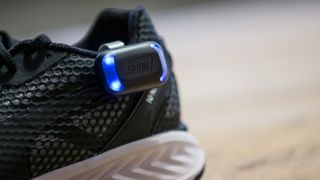
Today’s column was supposed to be a deep dive into the best tech on show at the London Marathon Expo, a chance to show off how much stuff was on offer to the budding marathoner and helping them get faster.
Except there wasn’t much there, and I nearly managed to ruin my marathon before I'd even got into the event. I decided it would be a good idea to try the first challenge I saw when I walked in the door, running 400m at world record pace on a bouncy treadmill.
I did it – but the second I stepped off the treadmill I realised my hamstrings had turned to concrete and were in pieces. Oh no. Oh no. OH NO!

I did win a hat though.
I also got a chance to go hands-on with Garmin’s rather exciting new Forerunner 935 multisport watch (do check that out if you’ve got serious aspirations to do, well, any sport) and saw the new versions of the bone-conducting – but beyond that, only one thing stood out.
That was Arion, a smart insole that promises to paint a new picture of your running style to give you insider knowledge that even a top-end coach would struggle to note.

The insole is a super-slim little device that goes inside any shoe (including any with specially-made insoles already) and packs in eight sensors to monitor pressure.
Get daily insight, inspiration and deals in your inbox
Get the hottest deals available in your inbox plus news, reviews, opinion, analysis and more from the TechRadar team.
The insole has a small cable that slips out the side of the shoe and clips to a (rather ostentatious) block that contains an accelerometer, gyroscope and GPS unit, taking the place of a running watch when it comes to tracking your runs.
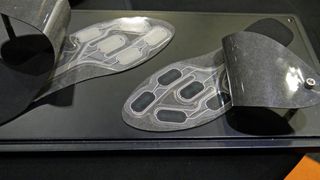
That ‘monitor block’ glows rather brightly, although you can change the colors of the LEDs that indicate it’s connected. Some might not like it, but for me having that on my trainer would be like finally wearing a pair of LA lights trainers.
The result is technology that can see exactly where your foot is pressing down throughout each step on a run and can show where you might be losing speed due to an issue with running gait or form.
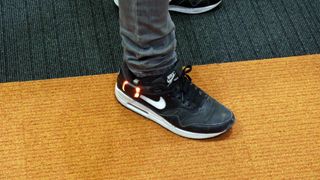
The demo I was shown by CEO Andrew Statham offered just that: a look at an elite runner who, it turned out, wasn’t using all their toes on one side and thus was suffering from a loss of power from their right leg.
A physio or coach saw that data and found the problem was in the thigh, where a ruptured muscle was causing an imbalance. Fixing something like that can boost speed by a few per cent, which really matters at elite level.
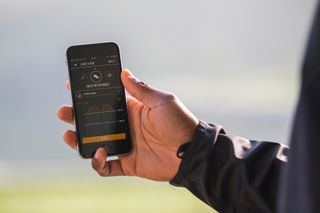
Fine, but what about the more hobbyist runner, someone who’s not going to be troubling the Olympic squad but wants to know a little bit more about their running style, find any possible injury issues and get a little bit faster?
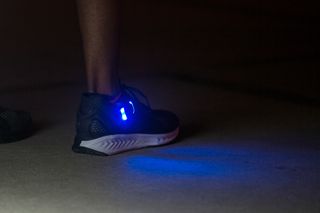
Statham told me that was where the artificial intelligence baked into the software platform – available both online and through an app – came to the fore.
When starting up the system you’ll be taken through a training run, where you’ll be asked to log any pain and the location, intensity and frequency of it. From there the Arion platform will see if that data correlates with any imbalances in your system and will let you know if there’s anything that can be done.
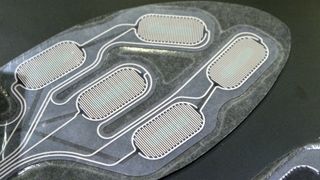
However, this isn’t necessarily anything new. I’ve seen a number of smart insoles in the past - and one of the lowest moments of my Running Man of Tech career was being unable to go out for a run as my smart socks weren’t charged up.
I had to sit down and have a little chat with myself after that.
What did impress about Arion is the fact that it uses the data it’s gleaned from your running - such as where you pronate, if you’re a mid-, fore- or heel-striker and will offer a tailored plan to help you correct things.
Within that plan, Statham told me that you could tell the app what you’re training for, and rather than just squeeze in as much training as possible to get you ready it would analyse your abilities and tell you whether the goal was possible.

After all, there’s no point in training for a half marathon in just eight weeks if you can barely run at all, right?
Overall, it’s one of the more impressive run-monitoring systems I’ve seen demonstrated, purely because it does one thing most don’t: adapts your training depending on the feedback you’ve given it through just running.
So if you’re heelstriking too much, the Arion platform will be ping you on certain days to offer certain sessions - whether it’s where to place your feed optimally or hitting a certain cadence, for example - and will monitor you throughout the session.
And only when you’ve achieved the app’s defined goal will you get the chance to move onto the next level, meaning you’ll really have to dedicate yourself to changing to improve… I like the idea of gamifying this.
There are still obvious questions over this system of course, the first being whether many would pay this much for the running information Arion is offering.
For €150 (around £125, $160, AU$210) you’ll get two insoles and one monitoring block, but for €250 (around £210 / $270 / AU$350) you’ll get two monitoring boxes to give feedback on both feet at once.
If you go for the former option you’ll need to keep alternating feet to get the full picture of running, which seems a bit inefficient and liable to take much longer to give the data you need.
There’s also the question of what happens with your data: Arion’s Statham told me that the brand was aiming to open up its software so it can sync with popular online apps like Strava, but it won’t be there at launch, hopefully coming in September - the entire system is now in the pre-order phase, with a release planned soon in 2017.

And the big question for me is: will this really work for the average runner? I can see that it’s a good insight for a coach or physio, someone that knows what they’re doing, but for the average runner will the app be able to give them enough information to make significant gains?
Will it spot an imbalance in your butt and tell you the right strength sessions to solve it? Will it tell you not to run if your hamstring is tweaking? Will it sync with a watch one day to give more useful information on the wrist? (Although it seems there are already smartwatch apps capable of doing just that with the Arion system.
I’m not saying that Arion can’t do these things, they’re just the missing link between a true smart coach in your shoe and another piece of tech that promises a lot but just gives us more information we don’t know what to do with - but I’m definitely looking forward to trying this out to see a clearer picture of my running.
If you've got any tech questions ahead of the big day - or just about running in general - feel free to get in touch using the links below, or the email address in my author bio! It'd be great to answer some direct questions from runners over the next few days.
- Gareth Beavis is TechRadar's Running Man of Tech, bringing you a daily diary as he counts down to the big race at the London Marathon.
- Day 1: The reasons behind the run
- Day 2: The tech I'll use to take the start line
- Day 3: In search of the perfect training plan
- Day 4: The tech you'll need to start running
- Day 5: The conundrum of working out the perfect pace
- Day 6: Running the final 6 miles of the London Marathon
- - If you want to say hi, he's @superbeav on Twitter
- You can see his stumblings on Strava
- And for more data, follow him on Smashrun
- And if you want to get the full lowdown on the latest and greatest running tech, read the rest of the Running Man of Tech story here

Gareth has been part of the consumer technology world in a career spanning three decades. He started life as a staff writer on the fledgling TechRadar, and has grown with the site (primarily as phones, tablets and wearables editor) until becoming Global Editor in Chief in 2018. Gareth has written over 4,000 articles for TechRadar, has contributed expert insight to a number of other publications, chaired panels on zeitgeist technologies, presented at the Gadget Show Live as well as representing the brand on TV and radio for multiple channels including Sky, BBC, ITV and Al-Jazeera. Passionate about fitness, he can bore anyone rigid about stress management, sleep tracking, heart rate variance as well as bemoaning something about the latest iPhone, Galaxy or OLED TV.
Most Popular

